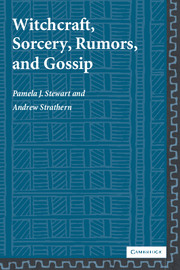Foreword
Published online by Cambridge University Press: 20 November 2009
Summary
In this book we explore two intertwined themes: the study of witchcraft and sorcery and the analysis of rumor and gossip. While there is a considerable amount written on both themes, generally they have not been brought together systematically. It is illuminating to do so for several reasons. One is that gossip and rumors play an important part in the processes leading to accusations of “wrongdoing,” which include witchcraft and sorcery accusations. Also, when witchcraft and sorcery ideas are not overtly at work, rumor and gossip may work as a covert form of witchcraft against persons. This leads to conflict, violence, and scapegoating in the same way as witchcraft accusations do. The two themes of our book are intrinsically, not casually, linked together. Both belong to the broader study of processes of conflict creation and resolution. In particular, they focus on the sources of tension in social relationships and the use of cultural themes and historical ideas in transforming these relationships. Witchcraft, sorcery, rumors, and gossip, which have been separate forms of stock in trade for anthropological descriptions, are in fact important general topics of social and historical analysis at large.
The sort of model of social action that we employ in our discussion of the topics is processual. We see witchcraft ideas not only as a set of cultural symbols expressing a mode of thought about the world, but also as deeply implicated in sequences of action.
- Type
- Chapter
- Information
- Witchcraft, Sorcery, Rumors and Gossip , pp. ix - xivPublisher: Cambridge University PressPrint publication year: 2003

